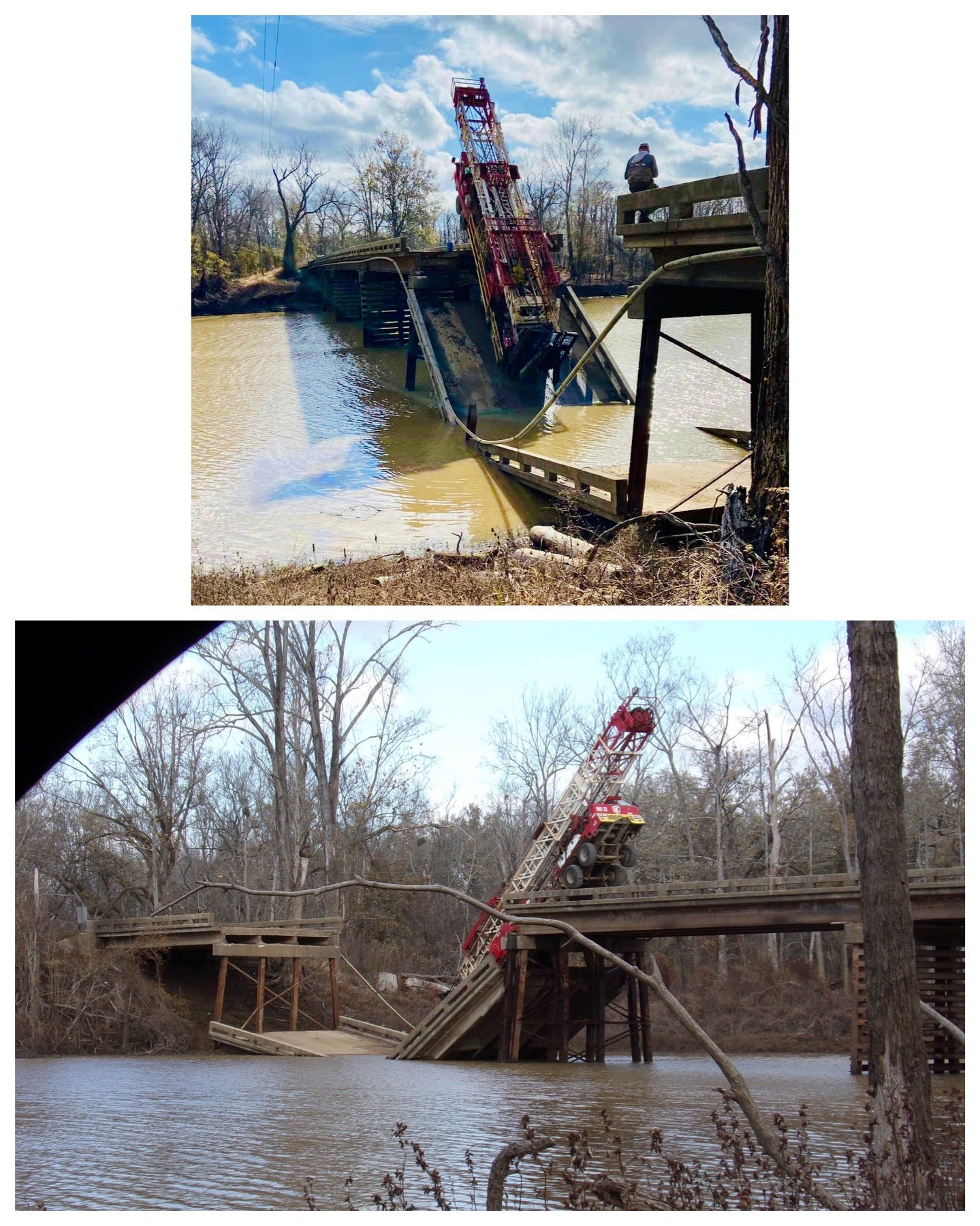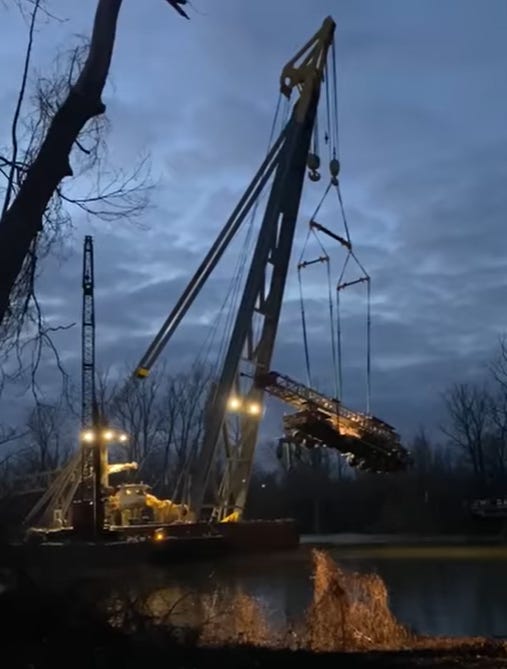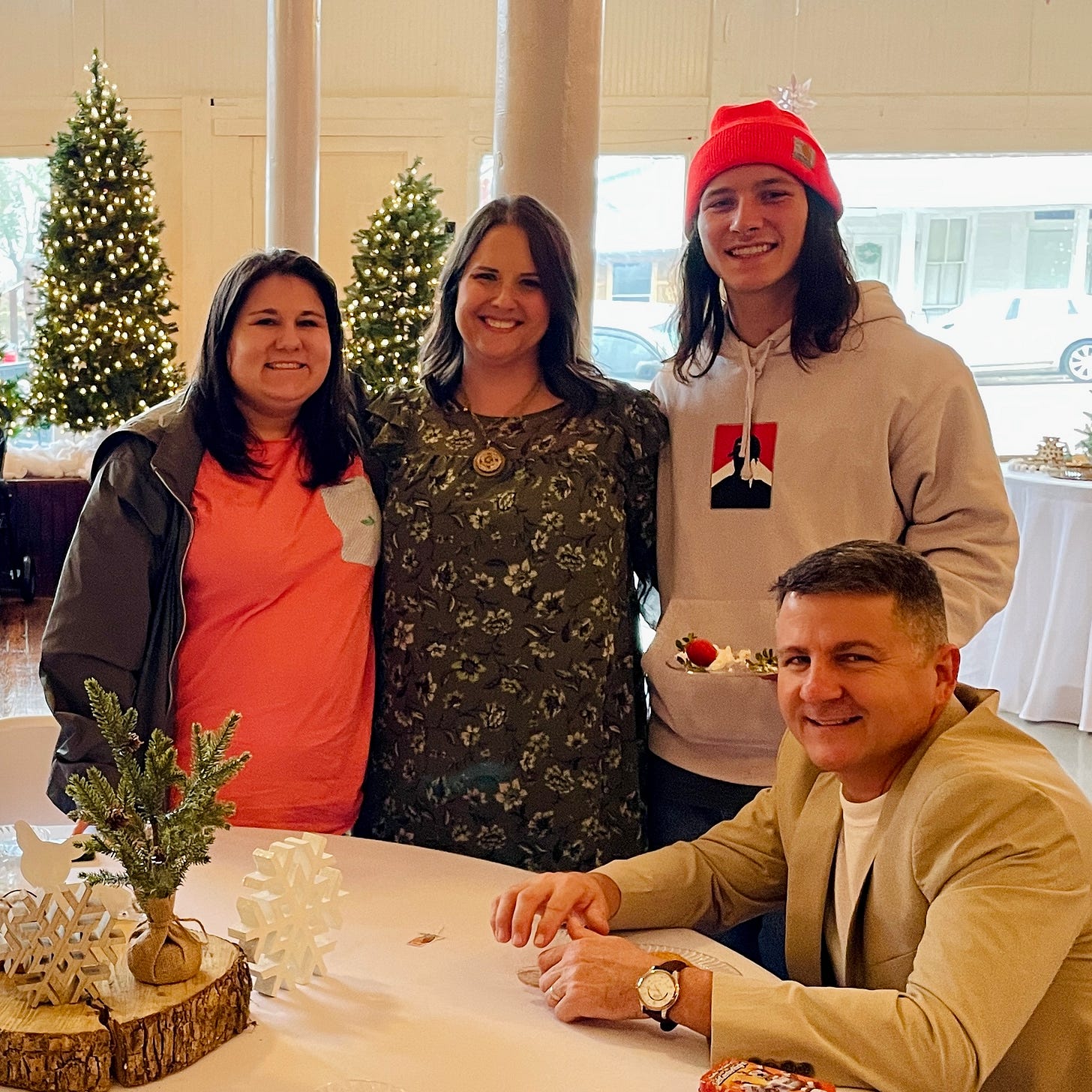Weight Limit Exceeded
what happens when you carry too much
There are over 250 of you subscribed to Release and Gather now, which kind of blows my mind since I don’t know about 95% of you outside of Substack. I have no idea how you managed to find this little space of the Internet, but I want to warmly welcome new subscribers Megan, Deborah, Elizabeth, Cathay, Pennie, 4waystoyummy, Lisa, Brandy, Brit, Ovi, Sarina, Calby, Nancy, Ed, Siya, Jo, Allison, Al, Michael, and George. Glad to have you here!
Yesterday
offered this wise encouragement in the weekly Substack Writer Office Hours:Someone here once asked the insightful question about whether we should spend time finding our "niche" as a writer, and I wanted to share something I learned early on in this Substack journey. I read a great article that stated this truth: when you post a newsletter, YOU are the niche! After a while, it's doesn't matter so much WHAT you write, as long as you're writing something you feel passionate about. Your true audience, the ones you want to attract, will stick with you no matter what your topic is, because they like your style, your viewpoint, and your unique voice. Niche down if you like, there's nothing wrong with narrowing your focus, but make no mistake: the most important part is that you keep showing up consistently, writing the thing you feel you should write in the moment. Don't chase audience, build community!1
If you stick around long enough, you’ll find the topics over here at Release and Gather are all over the place—cancer, eyebrows, job interviews, bad books, elk viewing, front yard urination (almost), rainbows, boudin, depression, inspection sticker fiascos, being a rulebreaker, connection, unexpected produce, and addiction. When I began this space, I had no idea what topics I would cover. I only knew I had to return to my lifelong love of telling stories through the written word with discipline and commitment. I told only a handful of people who know me in real life that I was doing this thing and tried not to think about whether or not anyone would subscribe.
One particular response to S.E.’s comment yesterday gave me pause:
Here at Substack, people are encouraged to collect fans for their personhood or for their writing voice. I can see how that might grow Substack. However, that self-focused approach is not necessarily the best way to build readership or to build a business.
If that’s the case, my Substack is doomed since it's mostly about me—my life, my voice, my experiences—all of which I share with the hope of helping others. Maybe something I write amuses or entertains, or perhaps it helps someone feel they aren’t alone in their experiences. My words might even help one see a new perspective. So while Release and Gather may be about me, it’s also about you, readers. I’m not looking for fans or followers. I’m simply looking for these posts to land in such a way that they leave you feeling a bit better. Thank you for being a part of this community.
Now, on to this week’s musings, which ties together news of a collapsed bridge and how that turned my thoughts to all that we carry. Don’t miss an update on Jonah at the end.
A Collapsed Bridge
I’ve been following a story in my community that’s had me pondering all that we carry.
At the southwest point of the State of Mississippi, you’ll find Wilkinson County, home to just over 8,500 residents and countless visitors who flock here for seasonal recreation. The west side of the county, bordered by the Mississippi River, is sparsely populated with most of the land being used for farming, hiking, hunting, boating, and fishing. Many come to hike at Clark Creek State Park’s 700+ acres of woods, steep bluffs, wildlife, creeks, and 10- to 30-foot waterfalls. Numerous hunting camps tucked away in other wooded areas draw hundreds of sportsmen annually, and seasonal camps line the perimeter of Lake Mary, an oxbow lake of the Mississippi River, inviting those who enjoy being on the water.
Pond, Fort Adams, and Lake Mary are the unincorporated communities that take you as far west as you can go in Mississippi. When traversing the narrow roads to those areas, one wonders how people could actually live so far from civilization, but make no mistake—quite a few call those areas home year-round. On December 29, residents and tourists alike were stranded during the holidays when the sole access point to one section of the county was cut when an oil well workover rig drove across a bridge, causing it to collapse.
The rig weighed in at 100,000 pounds, grossly exceeding the structure’s 42,000-pound limit that was clearly posted at the crucial Buffalo River overpass. Makes you wonder—what was that driver thinking?! Our smalltown newspaper described the situation:
The Jackson Point Road and bridge serve as the only entrance to that section of the county which has mostly secondary homes and hunting camps. It is the only land access to the extreme western area of Wilkinson County and southwestern portion of Adams County. With the bridge collapse, this remote area…is no longer accessible except via boat.

County officials originally estimated there could be up to 130 people on the west side of that bridge with 25 of them full-time residents. But in addition to the people, that area also hosts farmland that immediately became inaccessible to owners who lived elsewhere. In our warm climate in the southern U.S., crops need tending every month of the year.
The situation was a mess. As shown in the photos below, the supports under two 40-foot sections of the bridge gave way. Luckily for the driver, only the back end of the truck fell with the cab suspended above the bridge.

To meet immediate needs, the people stuck on the west side of the bridge banded together and hired someone to bring a small barge to them through the Mississippi River so they could transport people, vehicles, and personal items out of the area. The offending truck remained on the bridge over two weeks until January 15 when two barges hauling several cranes of various sizes finally arrived by traversing the Mississippi River and then up the Buffalo River to the collapsed bridge.
I found the write-up of the trial-and-error operation fascinating.2 In the end, the removal took about 11 hours. The next morning, the engine of the truck was cranked, and the vehicle was able to be driven back to its company’s yard. All's well that ends well, right? Not exactly.
How much time, effort, and money will it require to repair the bridge? What will landowners and residents do until then? They are, no doubt, experiencing the crushing weight of what now?
This blip of an event on the world-crisis radar has me considering:
What happens when the weight of what you carry exceeds the posted limit?
January, for all its clean slate and fresh-start-ness has handed me nearly more than my bridge can support. Our event venue—a very large 120-year-old building—normally sees a lull this month, but we have had event after event (I’m not complaining about more income there!).3 Recently, we had events back to back—on Wednesday, Friday, Saturday, Sunday, and Monday.
In the past, we’ve had some plumbing issues because no matter what signage one posts, people can be counted on to flush things they should not flush. Thankfully, Mike has always been able to get those unclogged with time to spare before our next event. When we arrived to clean after Friday night’s party, we found the toilets weren’t flushing.
I’ll spare you the disgusting details, but we were up all night (literally) trying to fix the issue before Saturday morning. Mike thought he resolved the problem, but then on Monday we got a call that the toilets were, once again, not flushing. We had three days to fix the issue before the next event. Thankfully, Mike finally fine-tuned his approach and got it done, but those days were extremely stressful.
Over the last week, I spent a lot of time telling God it was too much. I was ready to sell the albatross that we never asked for in the first place.4 It's not really an albatross, but in the muck of last weekend, being a small business owner certainly felt like a weight pulling me under.
I’ve had other commitments this month that have been physically, mentally, and emotionally draining—busy, but also wearying. While I usually try to schedule “me” time for reading and reflection, there’s been no room on the calendar this month.
I’ve been carrying a lot, and I suspect some of you have been, too. Too much on the calendar. Too many financial commitments. Too much people-pleasing. Too many possessions to maintain. Too much drama. Too many decisions to make. All of these add up and can push us to a point of decision.
Heed the posted limit and lighten the load, or press on and risk a collapse?
Maybe you heed the warning signs and don’t try to push the limit. It would have made better sense for me to turn down that request for a luncheon or push a commitment or two out to a less busy week, but saying “no” doesn’t come easy when you’re a helper.
Sometimes we ignore the warning and attempt more things anyway, and the bridge collapses. Sure we could camp out on the shouldn’t-have-gotten-yourself-into-this-mess-in-the-first-place line of thought, but that’s not helpful when the bridge has fallen. Maybe you’re left dangling or maybe you fall in the water, but you’ll likely need an assist or multiple assists.

Asking for assistance is difficult, but there’s usually someone willing to help get us back on solid ground. Maybe our engine will restart right away or maybe we’ll need a little work to get going again, but hard seasons are easier when we don’t try to go it alone.
Maybe our foundation will need repair. The key here is patience. Recovering from a collapse takes time, effort, and sometimes money. Small steps daily are the way to get there. Don’t look at the foundation crumbled in the water and become completely overwhelmed. Pick up the phone and make the first call. Maybe today all we need is to talk to a friend who can put us in touch with someone equipped to assess the situation.
Back on Solid Ground
Last week I had a check-in session with Jonah and his counselor. Next week it will be eight months since he entered a long-term rehabilitation program for his opioid addiction.5 The weight of all he’d been carrying for four years finally exceeded his limit. Shame. Guilt. Anxiety. Loneliness. Depression. Despair.
He’d run from all who loved him for so long, hiding all that heavy cargo until one day I showed up unannounced and uncovered it. His bridge collapsed, and he was left dangling. He needed help.
He didn’t want to enter a long-term rehabilitation program when we made the call, but he realized that he at least needed help getting out of the cab of the truck. He wanted help badly enough to get him in for detox. And when he realized that slowly but surely his rig was being set right again, he kept accepting the help again and again and again.
All that cargo he was carrying? So many people have helped him climb down to the rig and unload some of that weight—throwing it all into the river. Shame. Guilt. Anxiety. Loneliness. Depression. Despair. And with reliance on God, his Higher Power, he’s not diving in to retrieve it.
There’s still work to do—broken foundations aren’t easily or quickly repaired. But he’s at least learned how to lighten the load moving forward.
YOUR TURN
How’s your January going? Are you close to exceeding the posted limit? What can you do to ensure you don’t have any collapses?
https://on.substack.com/p/office-hours-65/comments
That’s a story for another day, but we have decent day jobs. Owning an event venue was never in our plans.





Great post, Holly! Reading The Ruthless Elimination of Hurry last year pushed me to make changes I already knew I needed to make. One of those was cutting back on social media, which I haven't missed much. I was happy to discover Substack for writing and community building... and to discover a writer from the other end of Mississippi. Glad to be a part of your community!
That is nicely written - I like the use of the collapsing bridge as a metaphor for our own life. As for me...well...I'm one of those who always feel I have more in the tank - more weight I can endure. And yes, I've learned the hard way that I needed to temper my expectations and lower my load because...as you pointed out... rebuilding is difficult and costly. Thanks for the reminder...as I busily spend my days juggling work obligations with extended holiday plans...